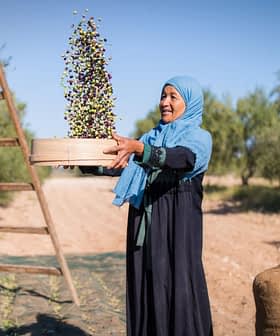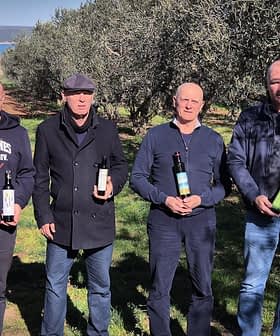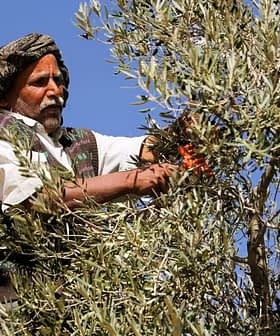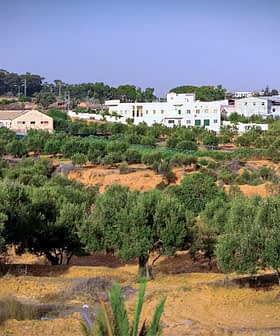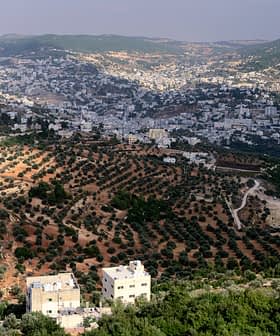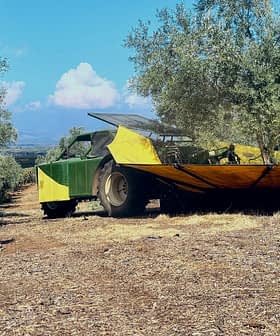Tunisia Expects Record-Setting Harvest
Thanks to above average rainfall, Tunisia is set for a record harvest, with predictions of a yield of 350,000 tons.
 Ample rainfall helped Tunisian producers this year
Ample rainfall helped Tunisian producers this yearTunisia is expecting a promising olive harvest this season, with projected figures suggesting a record yield of 350,000 tons, which would maintain the country’s position as one of the world’s top producers. The ideal climate conditions, including good rainfall, have led to optimism among olive producers in Tunisia, with some expecting a better-than-average harvest, while others in central Tunisia are more cautious due to the hotter and drier climate in that region.
Following a disappointing season last year resulting in a production of only 140,000 tons, the upcoming harvest in Tunisia looks to be promising.
Projected figures are even suggesting a record yield. Recently the Tunisian minister of agriculture, Samir Taieb, announced predictions of a yield of 350,000 tons.
The climate has been ideal with good rainfall. This is good from both a qualitative and quantitative point of view.
This would maintain this North African country’s position as one of the world’s top producers and perhaps even put it in second place. During the 2014/2015 season, Tunisia was the second largest producer after Spain with a record harvest of 340,000 tons.
Over the past few years, Tunisia’s average yield has amounted to 185,000 tons, a figure the government would like to boost to at least 230,000 tons a year. But during the last season, production had fallen to 140,000 tons, with 117,000 tons exported.
See Also:2019 Olive Harvest NewsTunisian olive oils have gained notoriety on the world stage for their quality, earning 17 awards at the 2019 NYIOOC World Olive Oil Competition.
The head of the Office National de l’Huile (ONH), Chokri Bayoudh, has said that the ONH has been examining measures to provide support in order to boost quality and production, thus improving the market for exporters and producers.
The sporadic rains over the past few months have been a blessing for many olive producers in Tunisia. Inadequate rainfall is one of their biggest challenges, but this year olive trees are thriving and their branches are hanging heavy with drupes as summer slowly makes way for autumn and the harvest season.
Selima Ben Hamouda of A&S, a sister-duo running an olive farm in Mateur in north Tunisia, 50 miles northwest of the capital Tunis, told Olive Oil Times that the upcoming harvest is sure to be a good one.
“We had rain in August, September and again at the beginning of October,” she said. “As a result, our olive trees are revived and this is beneficial for the upcoming harvest. We’re expecting it to be much better than last year. We start harvesting our Arbequina olives in November followed by our native Chetoui.”
Twenty-five miles further southeast in the region of Tebourba, Abdelmajid Mahjoub of Les Moulins Mahjoub is also expecting a better-than-average harvest.
“The climate has been ideal with good rainfall,” he said. “This is good from both a qualitative and quantitative point of view. Our olives haven’t changed color yet but soon they’ll be half green, half violet and ready to be picked by hand.”
“We start harvesting around the middle of November and this year it will be at the same time as usual,” he added. “We used to harvest at the beginning of December but now we begin two weeks earlier because of the effects of climate change.”
In Toukaber, 28 miles southwest of Tebourba, the landscape of rolling hills is a lush green, a rare sight in October.
© Olive Oil Times | Data source: International Olive Council
“The average annual rainfall is about 400 millimeters (15.7 inches) but we’ve had 600 millimeters (23.6 inches) so far,” Meher Ben Ismail, of Réserve Familiale Ben Ismail, said. “Rain is of course very important for our olive trees, especially since we don’t irrigate and depend entirely on rainfall. Temperatures have also been good lately and our trees are full of olives.”
“Our Chetoui olives are just starting to change color,” he added, referring to the varietal grown here in the north and known for its intense character. “We follow the early harvest method and usually start harvesting by the first of November, but this year it looks like we’ll begin at the end of October, so more or less at the usual time. Last year, we harvested earlier because it was a very hot and dry summer, but unfortunately the quality was not great. Of course, the weather has a big influence on quality.”
Mounir Boussetta, of Domaine de Segermès in Zaghouan, an agricultural area 37 miles south of Tunis, described the Ministry of Agriculture’s projected figures for the upcoming harvest as “very optimistic” but agrees that they should definitely be better than last year.
“In Tunisia, we tend to have a good harvest every alternating year,” he said. “It looks like the harvest in our region is going to be a promising one. My olives are not yet ripe, they’re still green at the moment and this is because of the rains we’ve had.”
“It looks like we’ll be ready to start picking at the beginning of November,” he added. “It’s important to harvest early and once that’s done, I start with pruning. That can’t wait too long. Usually I have a team of 100 workers hand-picking the olives but this year I’ll be lucky if I can find 80. It’s getting more and more difficult to find workers.”
However, as the annual harvest is set to begin in Tunisia, not all producers are optimistic. Further south, in central Tunisia, an olive-growing region where the Chemlali variety dominates and the climate is hotter and drier, Slim Fendri, of Domaine Fendri, does not have high expectations.
“We’re not expecting a good harvest in central Tunisia,” he said. “It will be average at best. Last year was not a good year because of drought. Though there has been some rain in this region lately, it hasn’t been sufficient. We’re definitely feeling the effects of climate change.”


